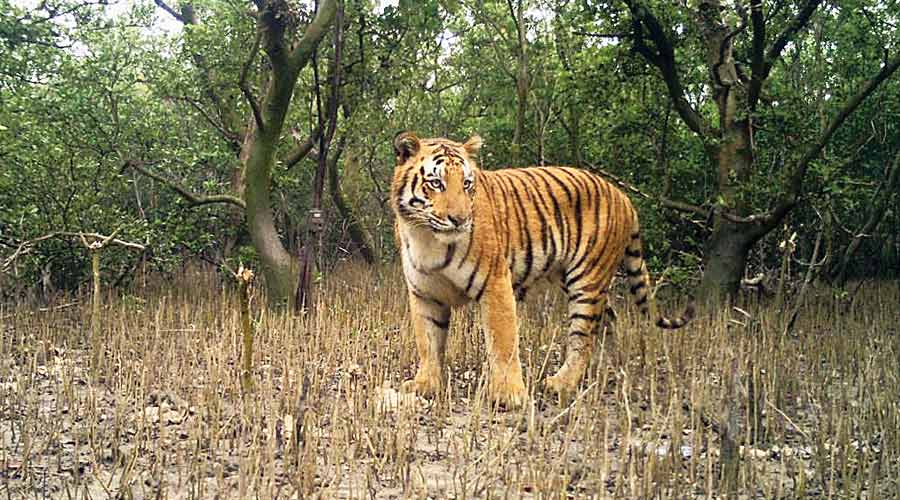A fisherman was killed by a royal Bengal tiger in the Jhila 1 area of the Sunderbans when he was rowing home around dawn on Friday.
Police and local residents said an adult tiger had swam around 200metres in pursuit of a small fishing boat and attacked Anna Das, 50, reportedly leaping into the vessel from its rear and then attempting to drag him off.
Other fishermen on the boat, however, sought to thwart the attempt by beating the tiger with bamboo sticks even as the big cat had Das in a death-grip at the neck. But Das soon died.
The boat returned with the mauled body of the victim to Atapur village in North 24-Parganas’s Sandeshkhali, from where they had all sailed two days ago. The body was sent for an autopsy to the Basirhat district hospital.
The latest incident brings the fatality toll from tiger attacks in the Sunderbans to at least 26 over the past 14 months, an official of the state wildlife department said.
Sources in Gosaba said the fishermen had ventured deep into the Jhila forest area in the hope of catching crabs and had seemingly gone as far as the prohibited zone.
“They went deep inside the creeks which are the turf of tigers. The big cat attacked the team when they were returning through an unprotected stretch close to the muddy bank of a khal (canal),” a forest department officer said.
“Anna dada was sitting on the edge of the boat when the animal jumped over the vessel and attacked him. It mauled him by the neck and tried to drag him away. We battled hard to resist it. But by that time, he had died from heavy bleeding,” said one of the fishermen.
The Sunderbans constitute the world’s largest mangrove delta, crisscrossed by rivers and creeks. Most of the creeks are very narrow and at around 20feet wide, generally are lucrative to fishermen owing to the existence of crabs and fish.
“But the fishermen in these creeks often come under attack from tigers. The tigers do not merely attack them once they try to come close to the bank, rather the big cats often jump over the boats once they come closer through the narrow creeks,” said one villager.
Foresters blamed fishermen for “inviting danger” by entering the deep jungle.
“There is a strong prohibition on entry inside the jungle. We have taken up awareness drives among fishermen and urged them not to risk their lives and to try an alternative source of income like apiculture. But it appears they hardly paid any heed to our appeal,” a senior official of the state wildlife department said.
A senior official attached to a tiger reserve added: “The chances of an attack by a tiger have increased following Cyclone Yaas. Several stretches of the forest have been inundated, making for an adverse impact on tigers also. In many places, tigers have come out close to river embankments. In such a situation, the fishermen should be more careful.”
Sandeshkhali’s Trinamul Congress MLA Sukumar Mahato said: “A survival crisis owing to Cyclone Yaas, coupled with Covid-19, compelled fishermen to risk their lives and flout official restrictions.”
“I will take up the matter with the state government so that the victim’s family gets compensated.”










